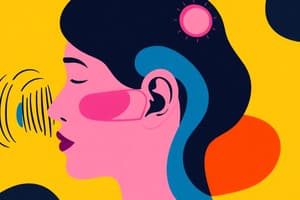Podcast
Questions and Answers
What are some common symptoms of Auditory Processing Disorders (APDs) mentioned in the text?
What are some common symptoms of Auditory Processing Disorders (APDs) mentioned in the text?
Inability to separate sounds, Problems with auditory memory, Difficulty following verbal directions
Explain the difference between Conductive hearing loss and Sensorineural hearing loss.
Explain the difference between Conductive hearing loss and Sensorineural hearing loss.
Conductive hearing loss is when sound can't travel through outer or middle ear efficiently, while Sensorineural hearing loss results from inner ear or auditory nerve damage.
How can auditory training help individuals with Auditory Processing Disorders (APDs)?
How can auditory training help individuals with Auditory Processing Disorders (APDs)?
Auditory training helps individuals learn to identify and discriminate between sounds.
What is the purpose of using Cochlear implants as a treatment for hearing disorders?
What is the purpose of using Cochlear implants as a treatment for hearing disorders?
How can increasing awareness and understanding of auditory disorders benefit individuals who suffer from them?
How can increasing awareness and understanding of auditory disorders benefit individuals who suffer from them?
What is CNGA3-achromatopsia and how does it affect patients' vision?
What is CNGA3-achromatopsia and how does it affect patients' vision?
What changes were observed in CNGA3-achromatopsia patients following retinal gene augmentation therapy?
What changes were observed in CNGA3-achromatopsia patients following retinal gene augmentation therapy?
How did treated CNGA3-achromatopsia patients perceive red objects on dark backgrounds differently after surgery?
How did treated CNGA3-achromatopsia patients perceive red objects on dark backgrounds differently after surgery?
What were the results of tailored tests conducted to evaluate color perception in CNGA3-achromatopsia patients?
What were the results of tailored tests conducted to evaluate color perception in CNGA3-achromatopsia patients?
What did the study suggest about the color perception of treated CNGA3-achromatopsia patients compared to sighted individuals?
What did the study suggest about the color perception of treated CNGA3-achromatopsia patients compared to sighted individuals?
Flashcards are hidden until you start studying
Study Notes
Understanding the Auditory System
We rely on our ears to navigate the world around us, and the intricate auditory system plays a pivotal role in this process. This article dives into the realm of auditory disorders, exploring auditory processing disorders and hearing disorders to better appreciate the complexities of our auditory system.
How the Auditory System Works
Before delving into the disorders, it's vital to understand the basic components and processes involved in our auditory system. Sound waves enter the outer ear, vibrating the ear drum (tympanic membrane), which in turn causes the three tiny bones known as ossicles to transmit vibrations to the inner ear. Inside the inner ear, hair cells in the cochlea convert these vibrations into electrical signals, which are then sent to the brain via the auditory nerve for interpretation.
Auditory Processing Disorders
Auditory processing disorders (APDs) are not related to hearing loss but rather a difficulty in understanding and processing sound information. These disorders are not always easily detected, as they do not impact a person's ability to hear. Instead, they hinder the brain's ability to interpret the signals received from the ear.
APDs can manifest in various ways, including:
- Inability to separate sounds: An individual with APD may have trouble distinguishing between similar sounds, such as 's' and 'sh,' 'b' and 'p.'
- Problems with auditory memory: People with APD might have difficulty remembering or recalling information they hear, such as names, numbers, or sequences of sounds.
- Difficulty following verbal directions: APD can make it challenging for a person to follow verbal instructions, especially ones that involve multiple steps or require them to listen and perform simultaneously.
Hearing Disorders
Hearing disorders, on the other hand, impair an individual's ability to perceive sound. These disorders can be broadly classified into two categories: conductive hearing loss and sensorineural hearing loss.
- Conductive hearing loss: This type of hearing loss occurs when sound is unable to travel through the outer or middle ear efficiently. Causes can include ear infections, perforated ear drums, and blockages (e.g., earwax, fluid buildup).
- Sensorineural hearing loss: This type of hearing loss results from damage to the inner ear or auditory nerve. Causes can include exposure to loud noises, aging, genetics, and autoimmune disorders.
Coping Strategies and Treatment
Fortunately, many auditory disorders can be addressed through various coping strategies, therapies, and interventions.
- Auditory training: This form of therapy helps individuals with APD learn to identify and discriminate between sounds by practicing and improving their "listening skills."
- Hearing aids: Hearing aids can be used to amplify sound and help individuals with hearing loss better perceive and understand sounds.
- Cochlear implants: Cochlear implants are surgically implanted devices that can help individuals with profound hearing loss to perceive and understand sound.
Final Thoughts
Auditory disorders can impact an individual's quality of life, but with proper treatment, coping strategies, and therapies, many people can improve their ability to hear and understand sound. By increasing our awareness and understanding of these disorders, we can help to support those who suffer from them and improve their chances of leading fulfilling lives.
Studying That Suits You
Use AI to generate personalized quizzes and flashcards to suit your learning preferences.




